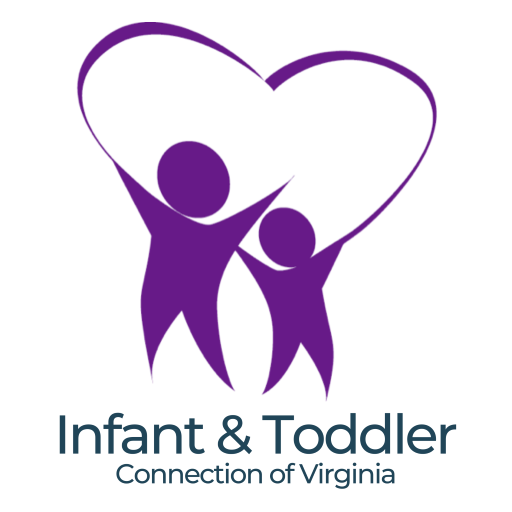
Early Intervention Overview
Although infants and toddlers learn and grow at their own pace…
…early childhood development often follows predictable patterns. Skills such as taking a first step, smiling for the first time, and waving “bye-bye” are called developmental milestones. Children reach milestones in how they play, learn, speak, act and move (crawling, walking, etc.)
For any number of reasons, many young children need a little extra help to reach certain developmental milestones. And since infants and toddlers grow and learn so quickly, it's important to get that extra help as early as possible if you or your child's doctor have any concerns about your child's development. Early identification and intervention can make a difference!
The Infant & Toddler Connection of Virginia provides supports and services for infants and toddlers and their families so that families can help their children learn during everyday activities and routines.
Families are early intervention!
You know your child better than anyone else. So, who better to help your child develop and grow? Mothers and fathers, aunts and uncles, brothers, sisters, grandparents, neighbors and friends, childcare providers: Children learn best from those who are most often with them. For this reason, families are at the very heart of early intervention. Our goal is to support you and the other caregivers in your family as you learn and acquire strategies to best support the development of your unique and special child.
Thank you for letting us be a part of your family’s journey.
What does early intervention in Virginia look like?
All U.S. states and territories provide early intervention supports and services to infants and toddlers with disabilities and their families. The law that makes this possible is called the Individuals with Disabilities Education Act (IDEA). This law is divided into parts; early intervention for infants and toddlers is Part C of the law. You may hear someone say Part C or Part C early intervention when referring to the early intervention system.
The federal government sets program guidelines that all states follow. However, early intervention may not look the same in every state. If you’re new to early intervention or relocating to Virginia from another state, here’s a brief overview of how it’s implemented in Virginia.
Click on each of the following statements to learn more about Part C early intervention in Virginia.
-
The Infant & Toddler Connection of Virginia believes that you—the parent or caregiver—are the expert when it comes to your child. You are also the best person to provide consistent learning opportunities for your son or daughter.
To support you in your role as expert, Virginia has adopted coaching as the preferred way to provide early intervention. Coaching means that the professionals who work with you and your child first demonstrate techniques and strategies for supporting your child’s development and then give you opportunities to practice these same techniques and skills. By teaching parents and caregivers how to help their children, the benefits of early intervention continue long after a visit has ended.
-
Functional outcomes refer to skills and behaviors that are meaningful to your child and family in the context of everyday living. In other words: What matters to you? We encourage each family to think about their daily routines and how they would like for their child to participate in them. Getting dressed in the morning, watching TV with grandma, going grocery shopping with dad…each child and family engage in multiple routines every day.
-
Early intervention supports and services are designed to help your child learn and grow in three (3) specific outcome areas. Simply stated, we want your child to:
Develop positive social-emotional skills (including social relationships). How does your child get along with other children? How does your child relate to you and to other adults? Positive social-emotional skills are important to a child’s overall development and well-being.
Acquire and use knowledge and skills (including early language/ communication and early literacy). How does your child learn and think? How does he solve problems? How does she use language? The skills your infant or toddler develops and uses early in life provide the foundation for future learning and growth.
Use appropriate behaviors to meet her or his needs. How does your child participate in feeding and dressing? How does your child move from one place to another? Does your child follow directions about safety? Your child’s use of appropriate behaviors is necessary for getting his or her needs met.
Your family’s Individualized Family Service Plan (IFSP) will identify how your child is currently doing in each of these child outcome areas. Knowing this is key to helping the IFSP team identify goals for your child and family and the services needed to achieve those goals. To help the team—which includes you as the child’s parent or caregiver—decide how your child is currently functioning in each area, Virginia uses data collected during the assessment for service planning (ASP) along with a tool developed just for this purpose, the Decision Tree. The Decision Tree provides a way for families and professionals to measure the effectiveness of early intervention in a way that is uniform from locality to locality, team to team.
